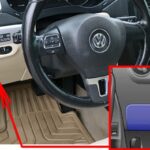The Anti-lock Braking System (ABS) light on your Volkswagen dashboard is a critical safety indicator. While regular maintenance helps prevent unexpected issues, understanding the ABS light’s meaning is crucial for every Volkswagen owner. This guide provides a comprehensive overview of the Volkswagen Abs Light, its implications, and the necessary steps to address it.
What Does the ABS Light Mean in a Volkswagen?
The ABS light illuminates when the system detects a potential problem. ABS prevents wheel lockup during sudden braking, allowing you to maintain steering control. A malfunctioning ABS can compromise your safety, especially in emergency situations. Several factors can trigger the ABS light, including:
- Low Brake Fluid: Insufficient brake fluid can hinder the ABS’s ability to function correctly. Regularly checking and topping off brake fluid is essential.
- Faulty ABS Sensors: Wheel speed sensors monitor each wheel’s rotation. A malfunctioning sensor can disrupt the ABS control module’s ability to regulate brake pressure.
- Damaged ABS Control Module: The control module is the ABS’s brain, processing sensor data and adjusting brake pressure. A damaged module can lead to system failure.
- Worn Brake Components: Worn brake pads, rotors, or calipers can indirectly affect the ABS, potentially triggering the warning light.
- Electrical Issues: Wiring problems or a failing ABS pump can also illuminate the ABS light.
What to Do When Your Volkswagen ABS Light Comes On
If your Volkswagen’s ABS light comes on, stay calm and take the following steps:
- Check Brake Fluid: Ensure the brake fluid reservoir is filled to the appropriate level. Low fluid can often be remedied by topping it off, potentially resolving the issue.
- Inspect Tires: Uneven tire wear or low tire pressure can affect wheel speed readings, potentially triggering the ABS light. Check for proper inflation and even tread wear.
- Restart Your Car: Occasionally, a simple system reset can resolve temporary glitches causing the ABS light to illuminate. Restarting your Volkswagen might clear the error.
- Seek Professional Diagnosis: If the ABS light persists after these initial checks, it’s crucial to have your Volkswagen inspected by a qualified technician. They possess the diagnostic tools and expertise to pinpoint the exact cause and perform necessary repairs.
Importance of Addressing the Volkswagen ABS Light
Ignoring the ABS warning light can have serious consequences. A malfunctioning ABS can significantly increase your stopping distance and compromise your ability to steer during hard braking. This puts you and other drivers at risk. Promptly addressing the issue ensures your Volkswagen’s safety and optimal performance. Regular brake inspections and maintenance can help prevent ABS problems and contribute to overall vehicle safety.

